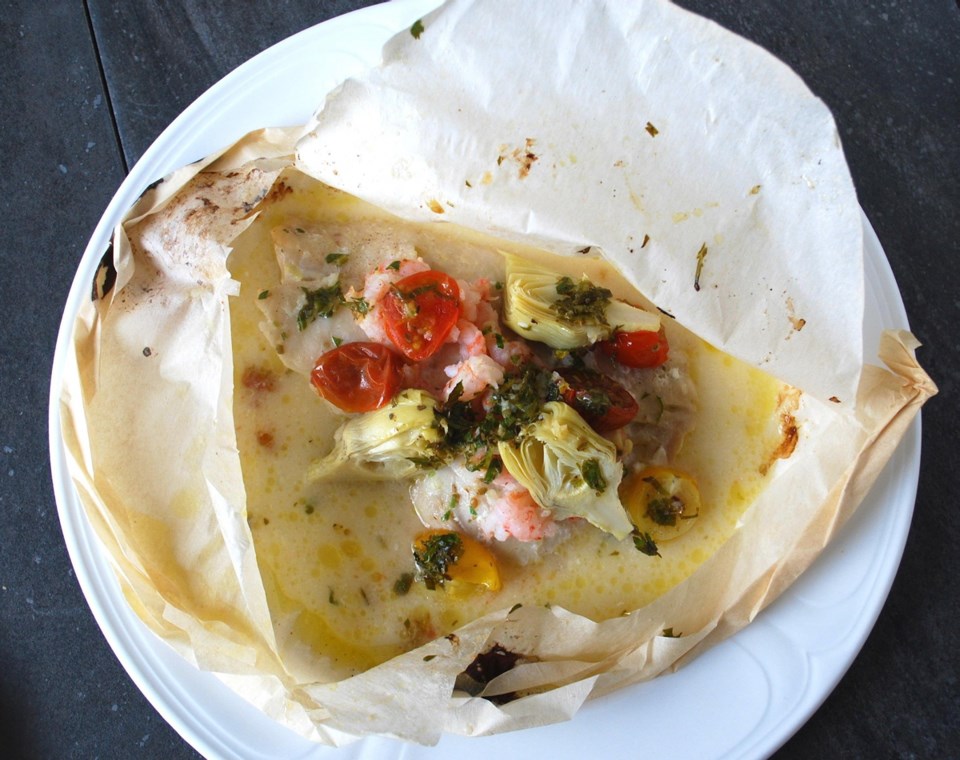Seal food in a package, let it cook and bubble with flavourings and before you know it something good will come out of the oven. That must have been what a French cook was thinking when first cooking food “en papillote.”
With regard to cuisine, the word papillote, pronounced pah-pee-YOHT, has two meanings.
One is the name of the small paper frills you can use to decorate the rib bones of a crown roast of lamb or pork. But when you insert “en” in front of papillote, the definition changes to mean food cooked in paper, not decorated with it.
In his book La Technique, famed chef Jacques Pepin says in days of yore, French cooks used brown paper bags to cook foods en papillote. That book dates back to 1978 and even then, Pepin, as is common practice now, used parchment paper, which is much safer in the oven.
Parchment paper, sold at most supermarkets, is a high density, moisture-resistant paper with a non-stick coating. It can be tightly folded, making it ideal to seal up and cook foods “en papillote.”
As noted in a previous story on parchment paper, I have read sources that suggest it is safe to use it at oven temperatures up to 450 F. But according to parchment-paper-maker Reynolds, it’s safe at oven temperatures up to only 420 F, which, luckily, is hot enough for cooking foods en papillote.
Many foods can be cooked “en papillote,” such as chicken breast or an assortment of vegetables for a vegetarian creation. But, judging by the volume of recipes for them, the most popular thing to cook en papillote is fish fillets or steaks, as it yields incredible, moist and delicious results even when slightly overcooked.
Today’s recipe is for Pacific snapper cooked en papillote with shrimp, artichokes, cherry tomatoes and aromatic flavourings. The recipe yields two portions, but could be expanded or even halved, if you’ll be dining alone.
Before you begin to seal the fish inside the parchment, have all your ingredients ready to go. That way you won’t be trying to fold the paper with messy hands.
Today I’ve used the more traditional method of cutting the paper into a heart shape first.
How to ready fish for cooking ‘en papillote’
1. Cut an 18- x 12-inch piece of parchment paper. Fold paper, widthwise, in half. Now cut the rectangle into a large, half-heart shape.
2. Unfold paper and set the fish and toppings on one side of it.
3. Fold the top of the paper over the food, then seal together by making small, tight, overlapping folds. Fold tip of papillote a few times to seal and it’s ready for baking.
Snapper en Papillote with Shrimp, Tomatoes and Artichokes
Serve this fish dish for two with boiled, miniature potatoes or steamed rice and some sliced baguette, to mop up the juices from the fish and other ingredients.
Preparation: 30 minutes
Cooking time: 12 to 14 minutes
Makes: Two servings
1 Tbsp lemon juice
1 Tbsp orange juice
1 Tbsp olive oil
1 small garlic clove, minced
1 Tbsp chopped fresh parsley
1/4 tsp dried oregano
• pinch crushed chili flakes
2 (175 gram) Pacific snapper fillets (see Note)
100 grams cooked salad shrimp
3 to 4 canned or bottled artichoke hearts, each halved or quartered, depending on size
6 to 8 cherry tomatoes, each halved
• salt and white pepper, to taste
2 tsp cold butter
Preheat oven to 400 F. Cut two pieces of parchment paper, each 18- x 12-inches in size. Fold each piece widthwise in half to create a rectangle, and then cut each rectangle, with scissors or a knife, into a large, half-heart shape.
Combine the juices, oil, garlic, parsley, oregano and chili flakes in a small bowl.
Unfold one of the pieces of parchment paper. Set a piece of fish on one side of the paper.
Top the fish with half the shrimp, artichoke and tomatoes. Now set on 1 tsp of the butter, broken in tiny nuggets, drizzle with half the juice mixture, and season with salt and pepper.
Fold the paper over the fish and, starting at top of the parchment half heart, make small, tight, overlapping folds along the outside edge. Fold the tip of package several times to seal completely.
Set your parchment package, flat, on a baking sheet. Repeat these steps with the other piece of parchment paper, fish and toppings.
Bake fish for 12 to 14 minutes, or until the paper has lightly browned and puffed and the contents are bubbling inside. Transfer the parchment packages to dinner plates. Cut open with scissors at the dinner table and enjoy.
Note: Pacific snapper, also known as rockfish, is sold at many supermarkets. Other fish fillets, such as cod, salmon or halibut, will also work here.
Eric Akis is the author of eight cookbooks. His latest is The Great Rotisserie Chicken Cookbook (Appetite by Random). His columns appear in the Life section Wednesday and Sunday.



